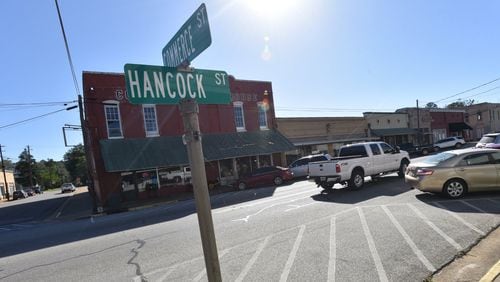Devastated by job losses, plant closings and population declines, rural Georgia communities are struggling to survive.
Those left behind face few job prospects in half-empty towns.
After decades of neglect, Georgia’s legislators say this is the year they’ll wield the government’s power to revitalize large swaths of the state that haven’t benefited from metro Atlanta’s prosperity.
Leaders of the Georgia House of Representatives recently proposed a sweeping plan to pay people to move to the country, subsidize internet connections, support small hospitals and expand business opportunities.
It won’t be easy or inexpensive. Skeptics question whether it’s even possible to reverse long-term economic trends that have drained talent and money from rural areas.
But state lawmakers believe they can make a difference.
“What we’re doing right now isn’t working,” said state Rep. Sam Watson, a farmer and Republican legislator from Moultrie. “Everything is on the table. We’ve got to try.”
Business costs for Watson's 500-acre farm, Chill C Farms, have steadily increased over the past year, but he's still selling fruits and vegetables such as bell peppers, cabbage, cucumbers, squash and tomatoes for about the same price.
He sees a need for food processing businesses to move into Georgia, which could reduce expenses and keep jobs in the state.
Soon after state legislators started talking about how to boost the economy of rural Georgia, they quickly realized that businesses won't come unless communities have the services to support them.
That's why the plan that the House Rural Development Council pitched last month focuses on internet access, tax incentives and health care rather than direct business recruitment efforts.
Individually, none of these proposals will transform rural areas. But if they all become law, legislators reason, the conditions might be right for the country to make a comeback.
Political forces appear to be aligned to pass bills for rural communities. House Speaker David Ralston and Lt. Gov. Casey Cagle, the president of the Senate, are pushing the initiative, which also has the support of influential companies such as AT&T, which could benefit from internet subsidies.
One part of the plan calls for giving state income tax deductions up to $100,000 a year over a decade to people who agree to move to rural areas.
Wesley Tharpe, the research director for the Georgia Budget and Policy Institute, doubts it would motivate many people to migrate out of town.
“A tax incentive like this could provide some benefit around the margins,” said Tharpe, whose group often criticizes tax breaks. “The concern is that it could take dollars away from more proven solutions, like investing in schools and communities more directly.”
High-speed internet is a priority for legislators because it would make everything else possible: remote doctor appointments by video, student homework assignments and business operations.
Lawmakers are considering levying a communications tax on phone, subscription TV and internet streaming services such as Netflix, which would raise some $200 million to subsidize internet companies' costs for expanding to rural areas.
About 16 percent of Georgians lack access to high-speed internet, in large part because it's expensive to build — up to $40,000 per mile in rugged areas.
What small towns and businesses need most is professional experts that could target specific projects and industries, then work with communities to get them off the ground, said Tara Bradshaw, the executive director for the Dublin Downtown Development Authority.
That could be accomplished through a state Center for Rural Development, which is part of state legislators’ plan. It would help areas identify their unique strengths, coordinate communication among businesses and public agencies, handle community planning, and recruit businesses.
“A lot of towns just don’t have the resources to know what they need to have done,” Bradshaw said. “We have these shells of formerly vibrant city centers. With a little energy and a lot of money, they could potentially draw some of that talent back in.”
Most small towns probably won't land industrial factories that employ hundreds of people, such as Kia Motors in West Point or Baxter International in Covington, said David Bridges, the president of Abraham Baldwin Agricultural College in Tifton.
But there are many opportunities to connect businesses with potential employees, promote small businesses such as beer breweries or expand existing companies.
“We’ve got to focus on the low-hanging fruit and small opportunities with local employers that are doing well and making money. If they’re employing 12 or 20 people, we can help them go to 20 or 40,” Bridges said. “We’ve got to try to match opportunity with the assets and resources that are available.”
As for rural health care, the state could expand access to fill the gap left by hospital closures.
State representatives are supporting several ideas, such as micro hospitals with a handful of beds and overnight care, streamlined billing systems that could reduce costs, insurance premium relief for rural practitioners and Medicaid payments based on patient outcomes rather than services provided.
Another health proposal would eliminate the state's Certificate of Need regulation for hospitals in populated areas with many health care options, while keeping rules in effect for rural areas where hospitals are struggling. The Certificate of Need law restricts private companies' ability to cherry-pick the profitable functions of hospitals.
Ralston, the leader of the House of Representatives, said legislation supporting rural Georgia is a priority for this year's session of the Georgia General Assembly, which begins Jan. 8.
“The ultimate goal … is empowering private business to expand and grow jobs in rural Georgia, and lift the quality of life up for a major, major part of this state,” Ralston, R-Blue Ridge, told legislators in Milledgeville on Dec. 13. He called on state lawmakers to bring “energy and focus in a part of our state that needs it so desperately.”
Rural Georgia trends
- Population: Seven counties account for two-thirds of the state's population growth from 2010 to 2015.
- Migration: About 71 percent of rural Georgians who moved in 2013 relocated to urban areas. About 23 percent moved out of state, and only 7 percent stayed in rural areas.
- Internet: About 16 percent of Georgia households, or 638,000 residences, lack access to internet with at least 25 megabits-per-second download speeds.
- Education: Adults in rural Georgia have completed college less than half as often as adults in urban areas. College completion rates in rural areas are 15.5 percent in rural areas compared with 31.8 percent in urban areas.
- Income: $30,870 per capita income in rural Georgia areas, compared with $42,290 in urban Georgia areas in 2015.
Source: University of Georgia
Rural proposals at a glance
- Pay income tax breaks to those who move to rural areas
- Provide state subsidies for internet construction
- Establish a Center for Rural Prosperity and Innovations
- Improve health care access by supporting micro hospitals and lifting regulations
Source: House Rural Development Council
Never miss a minute of what’s happening in Georgia Politics. Subscribe to PoliticallyGeorgia.com.
About the Author








